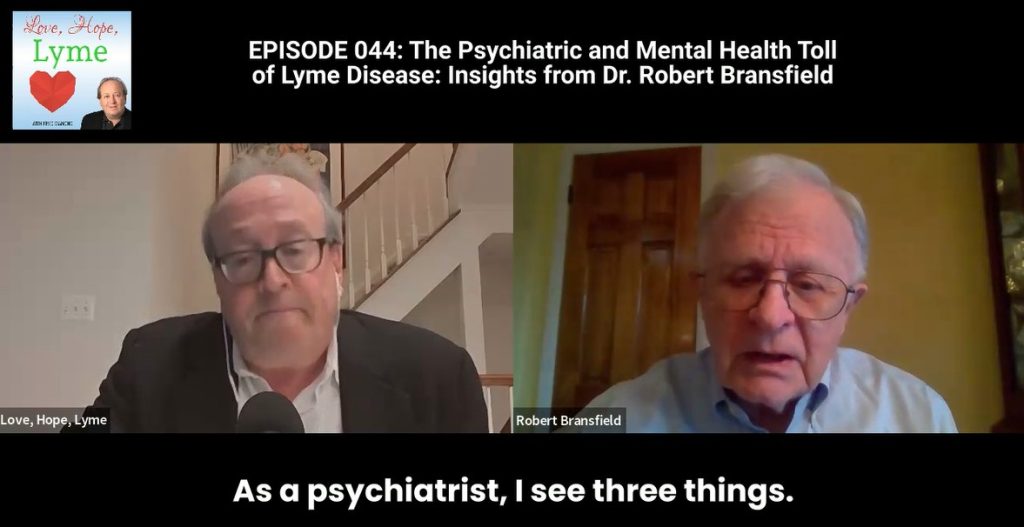PODCAST: Psychiatric and mental health toll of chronic Lyme disease

By Fred Diamond
Living with chronic Lyme disease can be a relentless battle, often misunderstood by those who haven’t experienced its toll.
Beyond the physical symptoms lies an equally challenging realm: the mental and emotional effects of the disease, many of which have been in the news recently.
Lyme disease is often regarded as a physical illness, marked by symptoms like fatigue, joint pain, and rashes. However, its psychiatric and psychological impacts remain under-discussed yet deeply significant.
Dr. Robert Bransfield, a renowned psychiatrist specializing in treatment-resistant psychiatric illnesses, sheds light on these often-overlooked aspects of Lyme disease on this week’s Love, Hope, Lyme podcast.
Dr. Bransfield has encountered thousands of Lyme disease patients throughout his career. “Probably my first patient was back in the early ‘70s, but at the time, I didn’t recognize it as a Lyme case. In retrospect, I’m sure it was.”
Over the decades, he has dedicated his work to understanding the psychiatric manifestations of Lyme and related infections.
Recognizing the Psychiatric Impact
According to Dr. Bransfield, psychiatric symptoms often emerge long after the initial infection. “The average person that I see in my practice is usually nine years post-infection,” he explains. While some cases progress rapidly, most patients experience a latency period before psychiatric symptoms like depression, anxiety, or even suicidal thoughts become apparent. This delayed onset can make diagnosis challenging.
Dr. Bransfield emphasizes the importance of understanding the physiological underpinnings of psychiatric symptoms in Lyme disease. “Everything’s caused by something. Some people call it psychiatric when they don’t know what to call it and they don’t understand it.”
He explains that Lyme disease often triggers an immune reaction, which can lead to inflammation and other physiological changes that manifest as psychiatric symptoms.
One of the most striking findings is the association between Lyme disease and suicide. “It’s the main cause of death with Lyme disease,” Dr. Bransfield states. He adds that studies have identified over 500 peer-reviewed journal articles linking Lyme and other tick-borne diseases to psychiatric illness, with 89 of them showing an association with dementia. “It’s hard to ignore that.”
The Role of Infections and Co-Infections
Lyme disease rarely acts alone. Co-infections like Bartonella and Babesia complicate the clinical picture. When asked whether certain infections are more to blame for psychiatric symptoms, Dr. Bransfield acknowledges Bartonella’s significant role.
“Bartonella comes up a lot,” he notes. However, he stresses that Lyme and its co-infections often interact in complex ways, amplifying each other’s effects.“When you get multiple infections, one plus one doesn’t equal two. That equals 11.”
These infections can affect the brain in three primary ways: immune activation, vascular effects, and direct infection of brain tissues. “You don’t necessarily have infection in the brain to have psychiatric symptoms,” he clarifies. Instead, immune activation in the body often drives psychiatric manifestations.
A Physiological Basis for Psychiatric Symptoms
The psychiatric effects of Lyme disease are not merely psychological reactions to chronic illness. Dr. Bransfield details the physiological mechanisms involved, particularly the role of inflammation and its impact on the brain.
“When you’re in this pro-inflammatory state, it increases an enzyme called IDO,” he explains. “This enzyme alters how the brain converts tryptophan, shifting it away from serotonin and melatonin production and toward neurotoxic compounds like quinolinic acid.”
“Quinolinic acid can make people suicidal and homicidal,” he states. “Autopsy studies of Lyme patients who died by suicide have confirmed the presence of quinolinic acid in their brains, providing direct evidence of this physiological link.”
Additionally, Dr. Bransfield highlights the role of sleep disturbances in disease progression. “Your body heals when you sleep,” he says, emphasizing the importance of deep, restorative delta sleep. Lyme disease often disrupts this cycle, leading to further health declines underscoring the need for targeted treatment.
The Human Cost: Personality Changes and Emotional Toll
Beyond the physiological impacts, Lyme disease takes a profound emotional and social toll on patients. Many experience personality changes, including mood swings, low frustration tolerance, and even explosive anger—a phenomenon sometimes referred to as “Lyme rage.”
“If you’ve ever seen Lyme rage, you’ll never forget it.”
Depersonalization and derealization are also common. “Depersonalization is when you feel like you’re there, but you’re not there.”
This symptom can be rooted in both neurological dysfunction and psychological defense mechanisms, such as those seen in post-traumatic stress disorder (PTSD).
“A neurological injury, like a brain tumor or even hitting your head on the roof of your car, can cause these symptoms,” he says, illustrating the diverse causes of these unsettling experiences.
For many Lyme survivors, the psychological burden is compounded by the loss of normalcy and strained relationships with family and friends. Dr. Bransfield urges loved ones to maintain hope and adopt an open-minded approach. “What you have to do is think outside the box for a problem that isn’t in the box.”
Systemic Barriers and Misdiagnosis
Dr. Bransfield laments the systemic barriers that Lyme patients face in getting proper care. Misdiagnosis is rampant, with many doctors dismissing Lyme symptoms as psychosomatic.
“A positive test doesn’t mean you have it, and a negative test doesn’t mean you don’t,” he explains, highlighting the inadequacies of current diagnostic tools.
Patients often encounter a fragmented healthcare system where specialists operate in silos. “We call it silo mentality,” Dr. Bransfield says. “Some people practice as if, ‘I’m a psychiatrist, that’s all I do.’ They don’t look at anything outside of that.” This narrow focus can prevent a holistic understanding of the patient’s condition.
Moving Forward: Collaborative and Compassionate Care
To improve outcomes for Lyme patients, Dr. Bransfield advocates for a collaborative and compassionate approach to care. He stresses the importance of listening to patients and remaining open to new information. “Arrogance is a very bad thing in medicine. You have to get away from that thinking and realize this is complicated.”
He also calls for greater awareness and education about Lyme disease’s psychiatric impacts.
“Information is power.” By understanding the physiological and psychological dimensions of Lyme disease, he says, healthcare providers and loved ones can better support those affected.
Dr. Bransfield’s work underscores the critical need to address the psychiatric toll of Lyme disease. His message to patients and their families is one of hope and perseverance.
“Don’t give up hope,” he urged. By fostering open-mindedness, seeking out comprehensive care, and advocating for systemic change, Lyme survivors and their loved ones can find a path forward for better care and understanding.
Click here to listen to all episodes of the Love, Hope, Lyme Podcast or on YouTube.
Fred Diamond is based in Fairfax, Virginia and can be contacted via Facebook. His popular book, “Love, Hope, Lyme: What Family Members, Partners, and Friends Who Love a Chronic Lyme Survivor Need to Know” is available on Amazon. The e-version of the book is always free to Lyme survivors. PM Fred on Facebook or LinkedIn for your copy.





















We invite you to comment on our Facebook page.
Visit LymeDisease.org Facebook Page